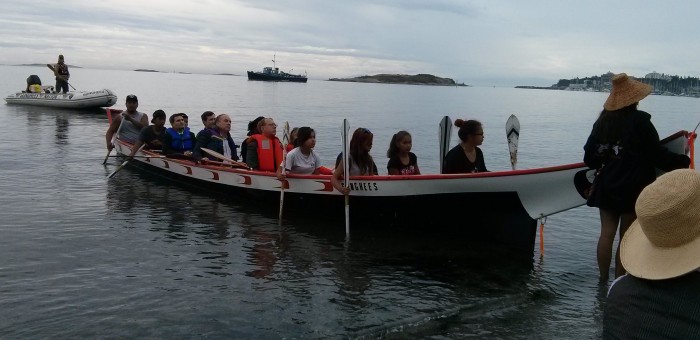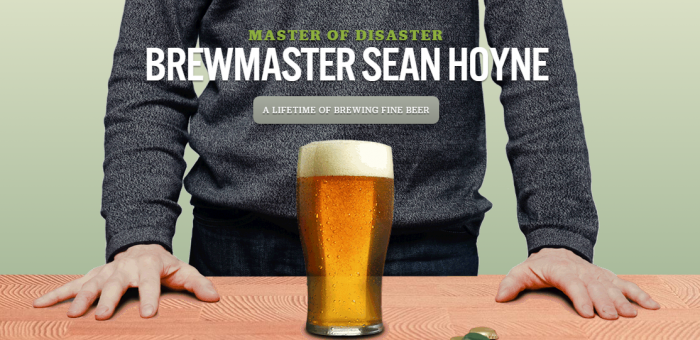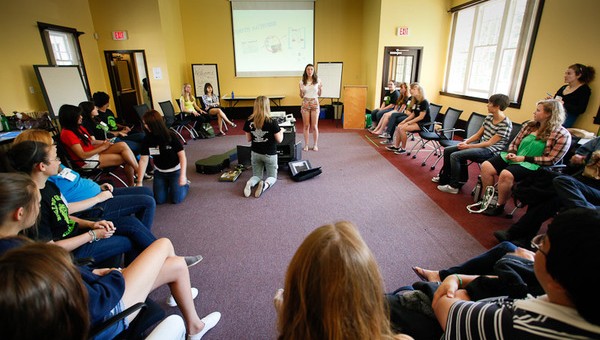Community Blog
Historic Cultural Canoe Welcoming Ceremony in Oak Bay
On August 8th, it was my distinct honour to participate in the welcome ceremony and opening of the Oak Bay First Annual Arts and Culture Festival. It was the first cultural canoe welcoming ceremony to take place in Oak Bay in over a century. I was part of the canoe entourage that included paddlers from the Esquimalt and Songhees Nations, a student from Oak Bay High School and local politicians. We paddled from Oak Bay Marina to Willows Beach, where we were greeted upon arrival and invited onto the beach by Chief Ron Sam and Songhees Elders.
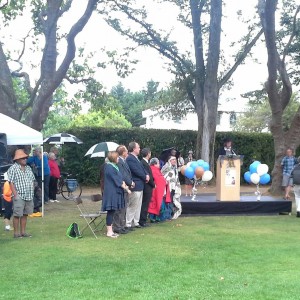 This was definitely a highlight of my two years as an MLA and I was profoundly humbled by the significance of the event. It brought home to me the importance of honouring and celebrating our indigenous history. In his remarks, Chief Sam told us it was an emotional day for him and those in attendance were also deeply moved. We were fortunate to bear witness to Elder Joan Morris presenting a blanket to the Acting Mayor of Oak Bay, Kevin Murdoch. The First Nations dance performances were inspiring and, even as the rain came, the crowd was appreciative.
This was definitely a highlight of my two years as an MLA and I was profoundly humbled by the significance of the event. It brought home to me the importance of honouring and celebrating our indigenous history. In his remarks, Chief Sam told us it was an emotional day for him and those in attendance were also deeply moved. We were fortunate to bear witness to Elder Joan Morris presenting a blanket to the Acting Mayor of Oak Bay, Kevin Murdoch. The First Nations dance performances were inspiring and, even as the rain came, the crowd was appreciative.
The event kicked off the week-long festival to celebrate our vibrant arts and culture community. Thanks to the organizers as well as Oak Bay Arts Laureate Barbara Adams who did such a wonderful job and I sincerely thank them for inviting me to participate.
Celebrating Local Businesses in Our Community – Hoyne Brewing Company
This is the fourth in our series highlighting innovation and creativity within our region’s business sector.
It was sweltering hot and the brewery was buzzing the afternoon we met with Sean Hoyne. As people filtered through filling growlers with their favourite beer we asked Sean to tell us about his brewery and how they got started. Though the Hoyne Brewing Company has only been open for three and a half years, Sean started their story in the 1970s – before commercial craft brewing had even begun in Canada.
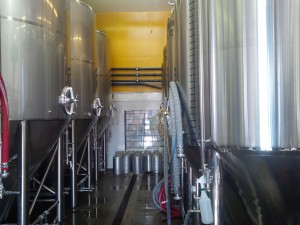 Frank Appleton, who Sean credits as the father of the craft beer movement in British Columbia, was a quality control supervisor at Carling O’Keefe’s but he had grown tired of the corporate beer scene and decided to quit in 1972. He spent the 1970s and 80s writing articles for the Harrowsmith magazine while brewing beer at his home in Edgewood, B.C. One of those articles, about the joys of home-brewing, caught the eye of John Mitchell who, at the time, was the co-owner and manager of the Troller Ale House in Horseshoe Bay.
Frank Appleton, who Sean credits as the father of the craft beer movement in British Columbia, was a quality control supervisor at Carling O’Keefe’s but he had grown tired of the corporate beer scene and decided to quit in 1972. He spent the 1970s and 80s writing articles for the Harrowsmith magazine while brewing beer at his home in Edgewood, B.C. One of those articles, about the joys of home-brewing, caught the eye of John Mitchell who, at the time, was the co-owner and manager of the Troller Ale House in Horseshoe Bay.
Mitchell had grown up in pub-rich England and was frustrated by the limited selection of beer in Canada. He tracked down Appleton and asked him if he would help him start a brewpub, a pub where good beer was both brewed and served. Far easier said than done at the best of times, Mitchell and Appleton first had to convince the local and federal governments to pass legislation that would make brewpubs legal. Previously, provincial law prohibited the public sale of beer at breweries but in 1981, after many meetings and rounds of legislation, they got approval to start brewing – and selling – their own beer from a single establishment (with the caveat that a commercial road separated the brewery and pub). Mitchell and Appleton opened Horseshoe Bay Brewery with a little store across the street on the waterfront, the first brewpub to open in North America since prohibition. From there, Mitchell and Appleton went on to open Spinnakers, Canada’s first in-house brewpub, and help dozens of other local breweries get started.
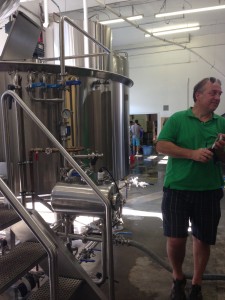 Sean enters this story, homebrewed six-pack in hand, in the late 1980s. He had a science degree to back up his beer brewing passion and he was keen to learn everything Appleton could teach him. He brought a case of homemade beer to his job interview with Appleton and let the beer speak for itself while they talked literature. Sean got the job and the two of them went on to set up the brewery in Swans Hotel in 1989. After a few years in the brewmaster role at Swans, Sean left to build the brewery at Canoe Brewpub. “I brewed there for 13 years, focusing on developing award-winning beers and fostering a sense of community between brewers and beer enthusiasts,” he said of his time at Canoe.
Sean enters this story, homebrewed six-pack in hand, in the late 1980s. He had a science degree to back up his beer brewing passion and he was keen to learn everything Appleton could teach him. He brought a case of homemade beer to his job interview with Appleton and let the beer speak for itself while they talked literature. Sean got the job and the two of them went on to set up the brewery in Swans Hotel in 1989. After a few years in the brewmaster role at Swans, Sean left to build the brewery at Canoe Brewpub. “I brewed there for 13 years, focusing on developing award-winning beers and fostering a sense of community between brewers and beer enthusiasts,” he said of his time at Canoe.
Ready to start a new chapter in a sector that was enjoying incredible public support, Sean moved into a space just outside of downtown Victoria and started to build the Hoyne Brewing Company. Starting with a team of one (himself), Sean is now one of 20 working at the brewery. In addition to serving liquor stores and customers who come into the brewery, Hoyne sells directly to bars and restaurants. They do their own deliveries, he explained, so they can provide the best service possible – even when their bottom line would recommend doing otherwise. They have partnered with Geazone, a local zero-emissions delivery service that uses electric cars and bike courriers, for their distribution. It costs more, said Sean, “but I like supporting Andrew, [Geazone’s president and CEO], because he is a young entrepreneur doing the right thing.” They even do their Victoria to Vancouver run with the zero-emissions fleet. Sean ensures two people are on each delivery run so they can share the job and help with the loading and rearranging of kegs in their drop-point’s cold room. It may seem like a simple gesture, but one that I’m sure is greatly appreciated by servers sent down to switch heavy kegs during rush hours. “We do what we can to support other businesses,” said Sean.
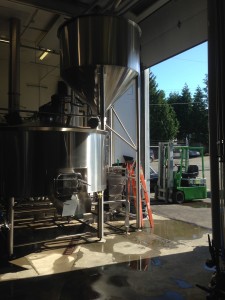 A central part of Hoyne’s mandate is to help wherever they can. It is a value system that has triggered countless positive ripple effects, both locally and abroad. They support charities (financially or with beer, where appropriate), including the Dirty Walls Project in India and source their equipment, hops, and malt from within B.C. The shiny stainless steel tanks found throughout the brewery were made on Vancouver Island and twice as expensive as their foreign-made counterparts, but the connections and collaborative friendships the brewery has made supporting local workers has made it more than worthwhile, said Sean. “If something is wrong with the tanks, they’ll be here at a moment’s notice to help out.” Local farmers are often at the brewery too, picking up loads of spent grain for their animals and gardens.
A central part of Hoyne’s mandate is to help wherever they can. It is a value system that has triggered countless positive ripple effects, both locally and abroad. They support charities (financially or with beer, where appropriate), including the Dirty Walls Project in India and source their equipment, hops, and malt from within B.C. The shiny stainless steel tanks found throughout the brewery were made on Vancouver Island and twice as expensive as their foreign-made counterparts, but the connections and collaborative friendships the brewery has made supporting local workers has made it more than worthwhile, said Sean. “If something is wrong with the tanks, they’ll be here at a moment’s notice to help out.” Local farmers are often at the brewery too, picking up loads of spent grain for their animals and gardens.
Comparing the rise of local craft breweries in B.C. with mega breweries like Molson that are now all run by non-Canadian owners (with the exception of Pacific Western), Sean attributes craft’s success with the sector’s determination to deviate from the mass-production business model. “Local craft breweries have social license,” said Sean. “They are involved in the community, transparent, open to the public, and authentic. I am in this industry because I like beer, to me it represents enjoyment and community.”
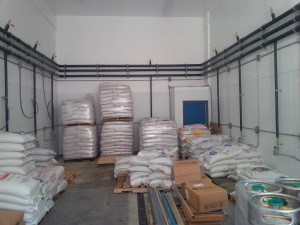 “People are always welcome to stop by our brewery,” Sean continued, “and every ingredient is listed on our bottles. We are proud of that.” As beer is not considered a ‘food product’ by the Canadian Food Inspection Agency, ingredient lists are not a requirement. Mass-produced beers, Sean explained, contain preservatives – which he stressed are not necessary unless you are selling old beer. “[At Hoyne] we don’t deliver our beer past where we can ensure it will arrive fresh so we don’t have to add anything extra, like preservatives. You can do things differently.”
“People are always welcome to stop by our brewery,” Sean continued, “and every ingredient is listed on our bottles. We are proud of that.” As beer is not considered a ‘food product’ by the Canadian Food Inspection Agency, ingredient lists are not a requirement. Mass-produced beers, Sean explained, contain preservatives – which he stressed are not necessary unless you are selling old beer. “[At Hoyne] we don’t deliver our beer past where we can ensure it will arrive fresh so we don’t have to add anything extra, like preservatives. You can do things differently.”
Sean and his team have made numerous adjustments to the status quo, from allowing their beer to naturally carbonate during the fermentation process (instead of releasing the CO2 and force-carbonating the beverage further along the production line) to building a glycol refrigeration system that allows them to cool individual tanks instead of the entire room.
As an enthusiastic supporter of the entire local craft beer sector, it was a pleasure to see the process in action and learn more about Hoyne’s community-based business model. Though I opted out of the taste-testing portion of my visit, because I was driving and had a CBC interview immediately afterwards, I already knew from experience that Hoyne’s Devil’s Dream IPA is one of my favourites.
Celebrating youth in our community – Erin Attwell
This is the 20th in our series of stories celebrating the outstanding accomplishments of youth in our community. These inspirational young adults are enriching our lives with their passion and commitment to the betterment of society.
Erin Attwell
 In 1929 the Hungarian writer Frigyes Karinthy put forth the notion that each and every person is only six degrees of separation from one another. But anyone who has lived in Victoria for a few years knows that it’s more like one degree of separation, or two degrees at most, within our community. And in the case of Erin, it is no different.
In 1929 the Hungarian writer Frigyes Karinthy put forth the notion that each and every person is only six degrees of separation from one another. But anyone who has lived in Victoria for a few years knows that it’s more like one degree of separation, or two degrees at most, within our community. And in the case of Erin, it is no different.
I first met Erin when she was three years old. She was a year younger than my son and both were attending Lambrick Park Preschool. Twenty years earlier, her father and I played rugby together at UVic and I was a TA for his Calculus class. While I periodically saw her father on the Tyndall turf coaching his son’s (and Erin’s twin brother’s) soccer team, I had no idea what Erin had been up to since preschool. So you can imagine my surprise when I learned on social media that the Erin Attwell recently won the overall General Classification cycling Yellow Jersey and Gold Medal at the Tour de la Rèleve de Rimouski.
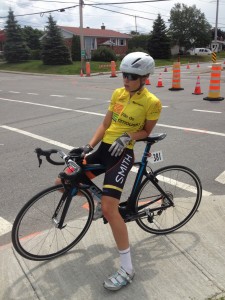 Erin was born in Victoria and attended Frank Hobbs Elementary School from kindergarten to Grade 5. In Grade six she enrolled in Maria Montessori Academy where she is currently entering Grade 11. Maria Montessori Academy is a small school with 300 students from kindergarten to Grade 12. Erin loves the small school and sense of community there. She describes it as a supportive learning environment with self-directed learning and a focus on independence. Students in grades 9 through 12 work together on projects in a common area. Her grade 10 class had 10 students and there were 7 students in the grad class of 2015. The Montessori philosophy teaches students to manage their own community and teachers facilitate learning through coaching and mentoring. Erin notes that there is no bullying at the school and learning is a very positive experience where students learn self-discipline and how to work together.
Erin was born in Victoria and attended Frank Hobbs Elementary School from kindergarten to Grade 5. In Grade six she enrolled in Maria Montessori Academy where she is currently entering Grade 11. Maria Montessori Academy is a small school with 300 students from kindergarten to Grade 12. Erin loves the small school and sense of community there. She describes it as a supportive learning environment with self-directed learning and a focus on independence. Students in grades 9 through 12 work together on projects in a common area. Her grade 10 class had 10 students and there were 7 students in the grad class of 2015. The Montessori philosophy teaches students to manage their own community and teachers facilitate learning through coaching and mentoring. Erin notes that there is no bullying at the school and learning is a very positive experience where students learn self-discipline and how to work together.
 From a very young age, Erin learned to ride a bike. Her Dad, a competitive cycling racer himself, got her on a bike “as soon as I could walk” and it was the beginning of her passion for cycling. She remembers having so much fun on rides with her Dad and many great times mountain biking at Hartland, a popular riding area at Mount Work Regional Park in Victoria.
From a very young age, Erin learned to ride a bike. Her Dad, a competitive cycling racer himself, got her on a bike “as soon as I could walk” and it was the beginning of her passion for cycling. She remembers having so much fun on rides with her Dad and many great times mountain biking at Hartland, a popular riding area at Mount Work Regional Park in Victoria.
Less than a year ago, Erin began cycling competitively when she joined the youth program of Tripleshot Cycling Club. She has done remarkably well in competition. As a rookie cyclist and member of the Tripleshot development team, Erin recently attended the Canadian National Junior (racing “up” in the age category U19 as a U17) Championship followed by the Tour de la Rèleve de Rimouski. At the Global Relay Canadian National Junior Cycling Championships, Erin won bronze in the individual time trial over a very difficult hilly course. Erin then went on to win 4th place in both the Road Race and the Criterium (a criterium is a bike race held on a short course, often run on closed-off city streets). This was not Erin’s first national experience as she won silver in the omnium at the Canadian Cycling’s national junior track championship in November 2014 in Burnaby, BC.
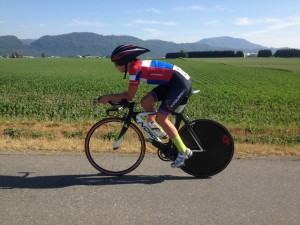 After the excitement of nationals, Erin went on to Rimouski, Quebec for the 5 stage Rimouski Internationale Tour de la Releve, where she was a guest rider with ‘Team NCCH p/b DEC Express’ coached by Rick Lee. Erin was on the Cadet team of four young ladies who won silver in the Team Time Trial. Erin went on to win the first long 78 km race, the 15 km Individual Time Trial, the 35 km Criterium and a brutally hilly and windy 76 km Road Race – these impressive wins gave Erin the overall General Classification Yellow Jersey and Gold Medal.
After the excitement of nationals, Erin went on to Rimouski, Quebec for the 5 stage Rimouski Internationale Tour de la Releve, where she was a guest rider with ‘Team NCCH p/b DEC Express’ coached by Rick Lee. Erin was on the Cadet team of four young ladies who won silver in the Team Time Trial. Erin went on to win the first long 78 km race, the 15 km Individual Time Trial, the 35 km Criterium and a brutally hilly and windy 76 km Road Race – these impressive wins gave Erin the overall General Classification Yellow Jersey and Gold Medal.
Next on Erin’s agenda is racing against adult women at BC Superweek, followed by the Rapha Pacific Northwest Juniors Classic Stage Race in Elma Washington, then onto the Western Canada Summer Games in Wood Buffalo, Alberta as a member of Team BC. Her season will continue with Track Provincials in Victoria in August and then Nationals in October at the newly-built Pan-Am velodrome in Milton, Ontario.
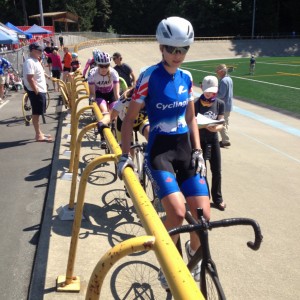 All this achievement has required a high dedication to training and considerable sacrifice. As Erin says, “doing something you love, you make sacrifices”. Her goal is to represent Canada at the World Championships and the Olympics. She says that her determination as a competitor has been inspired by her father. Others who have inspired and supported Erin are her personal coach Lister Farrar who has taught her to “never give up” and Peter Lawless, an accomplished lawyer and coach, who has been appointed Team Canada’s Ombudsperson for the Toronto 2015 Parapan American Games and the Rio 2016 Paralympic Games.
All this achievement has required a high dedication to training and considerable sacrifice. As Erin says, “doing something you love, you make sacrifices”. Her goal is to represent Canada at the World Championships and the Olympics. She says that her determination as a competitor has been inspired by her father. Others who have inspired and supported Erin are her personal coach Lister Farrar who has taught her to “never give up” and Peter Lawless, an accomplished lawyer and coach, who has been appointed Team Canada’s Ombudsperson for the Toronto 2015 Parapan American Games and the Rio 2016 Paralympic Games.
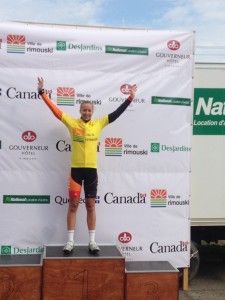 Erin has also received inspiration from Pro Rider Mical Dyck, who likes to ride with and mentor junior riders. Mical has been a role model for many and champions equity for girls and women in sport. Erin has recognized that the sport of cycling does not provide equal opportunities for males and females – and she believes (as do we) that needs to change. There are fewer opportunities for women and the prize money for winning a race is substantially less (sometimes 50% less than prizes for male winners). Erin will champion and support the Ride Like a Girl initiative to get more women and girls into mountain biking so they can experience the joy of the sport.
Erin has also received inspiration from Pro Rider Mical Dyck, who likes to ride with and mentor junior riders. Mical has been a role model for many and champions equity for girls and women in sport. Erin has recognized that the sport of cycling does not provide equal opportunities for males and females – and she believes (as do we) that needs to change. There are fewer opportunities for women and the prize money for winning a race is substantially less (sometimes 50% less than prizes for male winners). Erin will champion and support the Ride Like a Girl initiative to get more women and girls into mountain biking so they can experience the joy of the sport.
Starting in September, Erin is very excited to be entering the prestigious and highly competitive Pacific Institute for Sport Excellence (PISE) program. PISE’s mission is to ‘enhance the development of sport and physical activity excellence through a partnership approach delivering world class programs, education, innovation and facilities’. She will spend half-days at PISE four days a week, including 2.5 hours daily in the gym. The program at PISE is for athletes in all range of sports, where cross training and nutrition are emphasized. PISE has a teacher on site to assist students with their academic studies. Speaking of academics, Erin loves science and wants to enter the medical field to become a physician (like her father).
 Erin is an incredibly impressive young woman with a brilliant future ahead of her. She has the determination and drive necessary to succeed at the highest level. Her enthusiasm for the sport and dedication to ensure that girls and women are provided with equal opportunities bode well for the future of women’s cycling in Canada. Erin will make a terrific mentor herself someday and young girls will look up to her as an exceptional role model. She is mature beyond her years and we wish her every success on her journey.
Erin is an incredibly impressive young woman with a brilliant future ahead of her. She has the determination and drive necessary to succeed at the highest level. Her enthusiasm for the sport and dedication to ensure that girls and women are provided with equal opportunities bode well for the future of women’s cycling in Canada. Erin will make a terrific mentor herself someday and young girls will look up to her as an exceptional role model. She is mature beyond her years and we wish her every success on her journey.
Affordability & Metro Vancouver’s Potential Housing Bubble
Today in the legislature I rose to question the Minister of Finance as to what steps, if any, government is taking to ensure that Metro Vancouver’s potential housing bubble doesn’t burst and that housing remains affordable in the region. I further inquired as to what plans the minister has to gather data to ensure that future decisions and policy development are informed. Earlier in the day I introduced a Private Members’ Bill that would provide government with a tool to begin measuring the impact that speculation is having on affordability in Metro Vancouver.
Below are the text and videos of my speech and the Minister’s response.
Question
A. Weaver: Earlier this year we learned that the U.S. short-sellers are betting on a Canadian housing crash, calling it an accident waiting to happen. One article quoted a high-profile U.S. short-seller who described the Vancouver housing market as “a mix of money laundering, low interest rates.” And he went on: “A house is something you live in, but in Vancouver you guys are trading them like penny stocks on Howe Street.”
Government often points to global forces as the main reason we need to be so careful and deliberate with our economic management. I’m left wondering: where is the careful and deliberate action to ensure that Metro Vancouver’s housing market doesn’t become the next housing bubble?
More and more British Columbians are taking on bigger and bigger mortgages as housing becomes less affordable. The economic consequences of a burst housing bubble would be profound.
My question to the Minister of Finance is this. Can he provide this House with an update as to what actions, if any, his government is taking to ensure that Vancouver’s housing bubble doesn’t burst?
Minister’s Response
Hon. M. de Jong: To the member, the first thing I can do, perhaps surprisingly, is validate for him the interest, the curiosity, at times the fascination, that Americans have for the Canadian real estate market, the Canadian housing market, and that includes certainly the Vancouver market. That comes up frequently in the discussions we have from them.
I think it derives in large measure from their own experience and the trauma that they suffered after 2008. I think, further to that, it derives from the belief that if it happened there, it is destined and, therefore, must happen elsewhere.
What I tell them is this. I’ll respond, and I’ll tell the member and the House what I say to them. You do have to understand that there are some fundamental differences. The levels of equity that are involved in home ownership in British Columbia are, on average, very, very different than American markets. The rate of default and arrears thus far is very small, and the general stability of our banking system is different.
Now, I don’t say that at all to diminish or dismiss the concern, but this has been a high-value real estate market for a long, long time. What the government is doing is examining measures that may encourage first-time homebuyers to enter the market. We are, as well, through B.C. Housing, working to gather more information and more data. And I’m alive to the private member’s bill that was tabled today. We are also seeking to work with local governments to address issues around density that are a key part of the puzzle of addressing housing affordability.
Supplementary Question
A. Weaver: Thanks to the minister for his response there.
We’ve also recently heard from the Chinese consul general in Vancouver, Ms. Liu Fei, who suggested that the blame for the situation lies with “officials who monitor buyers, sellers and real estate developers.” She goes on to say: “People are blaming the buyer. It’s the wrong direction. I mean, the regulation here, nobody’s playing the role.”
Her point is that government must ensure that housing remains affordable and the bubble does not burst. Now, the first step towards formulating good housing policy is to ensure that the necessary information is available for analysis. For example….
Madame Speaker: A question.
A. Weaver: A question, I have. It’s a key question. Is the bare trust property transfer tax loophole that I have bought up several times here….is it actually incentivizing the speculative market?
My question then to the minister is: instead of rhetorical speculation contained in the reports that government released earlier this year, will the Finance Minister provide British Columbians with an outline of what data it plans to collect and analyze to determine what action is necessary to ensure that people retain access to affordable housing in Metro Vancouver, what plans does the minister have…?
Madame Speaker: Question.
A. Weaver: What plans does the minister have to gain and gather data to ensure that decision and policy is informed?
Minister’s Response
To the member, I must first of all confess that officials representing the government of the People’s Republic of China may have an affinity for centralized control and management that I do not share. But be that as it may, I think there is value in gathering additional data, which is why I’m pleased the Minister Responsible for Housing, through B.C. Housing, is working with agencies to gather additional data.
I mentioned earlier some of the other steps that the government has taken — I do believe, matters relating to density. I can provide the member with data and statistics about the average price of housing in Vancouver, which is actually lower than many people think. You can still purchase a home in Vancouver for under $400,000. About 30 percent of the homes that are exchanged or sold are sold for less than that.
I think that a big part of this is driven by the general economic circumstances, and if….
Madame Speaker: Thank you, Minister.
Hon. M. de Jong: Madame Speaker, since I don’t expect I’m going to get a question from the official opposition about the state of the economy or the public accounts that were tabled, I will take this opportunity to advise the House what people are saying.
Madame Speaker: Thank you, Minister.
Hon. M. de Jong: The national bank says B.C.’s economy is relatively buoyant, the budget is balanced, and the debt burden is relatively low and falling.
Madame Speaker: Minister.
Hon. M. de Jong: Little wonder B.C. is leading the way in Canada.
Video of Questions and Responses
Bill M227 — Land Title Amendment Act, 2015
Today in the legislature I introduced a Private Member’s Bill. If enacted, the Bill, entitled Land Title Amendment Act, 2015 would amend the Land Title Act to reintroduce and expand provisions that were previously in the Act. Such provisions will help determine who is purchasing property in BC. It would allow the government to determine foreign investment flows, the role corporations are playing, and whether we are seeing speculation in our market coming from other regions of Canada.
Text of my Speech
A. Weaver: I’m pleased to be introducing a bill that offers government one of the tools it needs to begin to properly assess and act upon the affordability and housing crisis affecting Metro Vancouver and emerging here in the capital regional district.
There’s been significant conversation in the past few months about the role that speculation is playing in our market. The government came out with a number of documents purporting that foreign investment wasn’t a factor. These studies were vague and lacked any links to clear, rigorous evidence that supported the claim.
It’s with this in mind that I bring this bill forward today. The bill amends the Land Title Act to provide the government with the means of determining who is purchasing property in B.C. This includes determining both foreign investment flows, the role that corporations are playing in purchasing property and if we have significant speculation coming from other places in Canada.
To be clear, this bill is not about identifying what specifically is driving housing prices to unsustainable rates but, rather, to ensure that government is informing itself so that any future policy measures are based on a better understanding of what is happening with our provincial real estate industry.
Video of my Speech
Press Release on Introduction of Bill
Media Statement: July 16, 2015
MLA Weaver Introduces Bill to help inform solutions to Affordability Crisis in Vancouver
Victoria B.C. -Victoria B.C. – Today, Andrew Weaver, MLA for Oak Bay-Gordon Head and Deputy Leader of the B.C. Green Party, tabled his private members bill that provides government with a tool to begin measuring the impact that speculation is having on affordability in Metro Vancouver.
“This is not about stopping the flow of investment or preventing growth in the real estate sector,” said Andrew Weaver. “We need to take serious and deliberate steps to smooth the rate of increase in prices to ensure that the region can manage the growth in a sustainable manner.”
If enacted, this Bill would amend the Land Title Act to reintroduce and expand provisions that were previously in the Act, which can help determine who is purchasing property in BC. It would allow the government to determine foreign investment flows, the role corporations are playing, and whether we are seeing speculation coming from other regions of Canada.
“Smart public policy requires good information about what action is needed,” said Andrew Weaver. “I am concerned that this government isn’t taking seriously the challenge of affordability that many people are experiencing in the Metro Vancouver. Strong, resilient communities are worth protecting.”
-30-
Media Contact
Mat Wright – Press Secretary, Andrew Weaver MLA
Mat.Wright@leg.bc.ca
Cell: 1 250 216 3382

